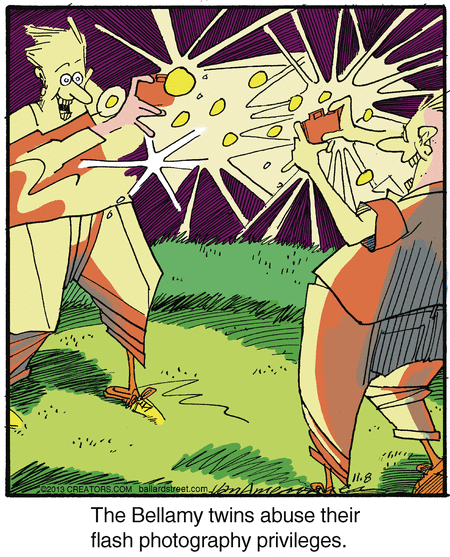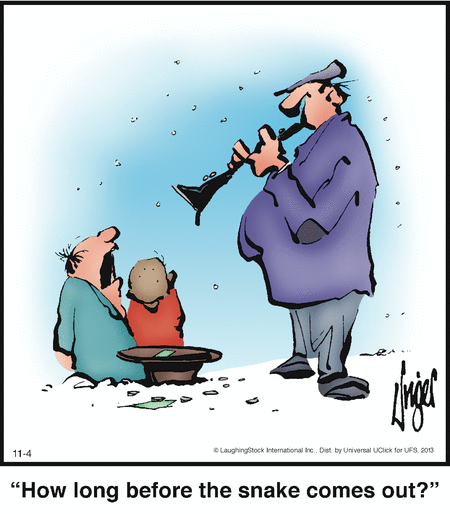November 9, 2013 – Saturday’s Smile




November 9, 2013 – Saturday’s Smile Read More »
Podcast: Play in new window | Download (Duration: 29:17 — 27.2MB)
Subscribe: Apple Podcasts | Spotify | Email | RSS | More

Do teachers still say this?
“Neatness counts.”
They almost always said it when I was young. I knew why. Kids didn’t always write legibly.
I figured the teachers were looking to make their lives easier. Perfectly fine. It’s hard to grade a test when you can read what the student wrote.
But…
My viewpoint was far more selfish.
If I was going to produce anything – including answers on an exam – then I wanted it to be readable. My penmanship was a reflection on me. Why speak if people don’t understand what you’re saying? Why write if people can’t read what you’ve written? Why make the writing get in the way of the message?
For me, it was about connection and being understood. It was probably my lifelong desire to be heard.
Why should we ever let things get in the way, or impede our progress? Verbal crutches hurt lots of speakers. In fact, here in Dallas our top sports talk radio station has a drive time team that did a bit about professional athletes using the phrase “you know” in their interviews. Some do it so much you can’t understand anything else they’re saying. It was a funny bit, but sad really.
We don’t want stuff getting in the way of our success.
A little old man approaches me asking for directions. Well, I assume he was asking for directions. For all I know, he was asking me for money or a job. Or he could have been offering me something. How was I to know? He wasn’t speaking English. It’s the only language I know. Some would argue I’m barely fluent.
He tried hard to help me understand, but it just wasn’t going to happen. All I knew is that he was speaking something other than English. Perhaps Spanish, but it could have been Portuguese. I really didn’t know.
I felt badly that I couldn’t help him. His effort coupled with my effort didn’t make a hill of beans difference. He couldn’t understand me. I couldn’t understand him.
Epic fail.
All I could do is apologize and walk away.
That’s what happens when our lives lack clarity or congruency. We just can’t make sense of it. Sometimes none of it makes sense.
Maybe it’s a family situation. Or a job. Or our business.
We feel lost. Sooner than later – if we don’t find a way to get ahead of it – it morphs into hopelessness. We need to attack it before it gets that bad.
Do you know why things almost always look better in the morning, after you’ve had a decent night of sleep?
Because our brain gets a bit of a reboot. It’s kind of like defragging our internal hard drive.
The day before we may have felt confused, unclear and unsure. Groping for understanding. Trying hard to make sense of it. Like the little old man and me – working harder to understand only frustrates things when nothing happening makes any sense.
Tomorrow is a new day. We often find some clarity in the morning. I’m not saying our problems are all solved in the morning, but more often than not it’s sure a lot better. We’re usually able to assemble some sort of plan to move forward after we’ve slept.
For decades I led physical businesses – commonly called “brick and mortar” businesses. Very early in my career I discovered the positive power of one of my quirks. Neatness.
In a retail environment cleanness matters. Go research any study done on what shoppers of physical stores prefer and you’ll see cleanliness and neatness near the top of every single one. Fact is, we enjoy shopping in neat and clean stores. We judge the book by the cover. Well we should. If people don’t take care of their surroundings, then how much pride and competence can they have?
In the late 80’s the President of Scandinavian Airline Systems, Jan Carlzon wrote a book, Moments of Truth. It quickly became one of my all-time favorite business books. In it, Mr. Carlzon made a point that resonated with me because I was (and still am) a fanatic about customer experiences. From Carlzon I first began to focus on the “moments of truth” or the customer points of contact. He observed that the average flier on his airline encountered 5 SAS employees with each point of contact – or moment of truth – lasting a mere 15 seconds. In 1986 SAS had 10 million passengers. That resulted, according to Carlzon, in 50 million moments of truth. He argued – and I completely agree with him – that it was during those moments of truth where his airlines’ success would rise or fall.
Carlzon made the famous the observation of coffee stains on a flip-down tray reflecting poorly on engine maintenance. Are the two connected? Yes, in the customer’s mind they are. The notion is, if you can’t keep the flip-down trays clean, then how could you possibly be on top of the engine maintenance?
For years earlier I had been a drill sergeant about clean stores, clean stock rooms and clean restrooms. I was fanatical about it and I’m sure employees thought it was one of my major quirks. It was, but for good reason. Clean and organized was appreciated by customers. Clean and organized was also a point of pride for employees. I stood before employees and asked, “Have you ever noticed that if you clean your car, inside and out, and do a really good job of it – the car seems to drive better?” Every employee knew that feeling. I preached that the same thing happens in the workplace. And at home.
Yes, it’s focus, but it’s so much more than that. It’s belief. It’s confidence. It’s feeling good about things. It’s clarity.
Cluttered desk, cluttered mind. I’ve heard it all my life and I’m not saying it’s 100% true, but my experience is that it’s mostly true. I’m not talking about moments of clutter. We’ve all be in the throes of a project or a deadline and things have turned chaotic around us. Forget those. Those aren’t moments of truth as much as they are moments of practical reality. But once the project or deadline is passed, do you continue with the clutter or do you regroup?
I’m urging you to regroup. Take the time to clean up and get organized. It’s impossible to not benefit from it.
Besides, we all need to look back at our work and feel good about it. A sense of accomplishment spurs us on to do more. To do better.
I’m not saying that a clean office, a clean work place or a clean home will insure success. I am saying that it can contribute to success though.
And I’m even willing to say that if your workplace or home is a wreck or a filthy mess, you won’t likely achieve very much. Personally, I’ve never seen it. I’ve never seen a house that was a wreck or a filthy mess be a successful home. Never. I’ve never seen a wrecked or filthy store make it. I’ve never seen a wrecked or filthy office be the residence of a successful business person. Maybe you have, but I haven’t.
I’ve seen environments that properly reflected the person occupying the space.
Is this a chicken and egg problem? Which came first, the cluttered space or the cluttered mind / person’s performance. I don’t know. And I don’t care. Because what I do know is I’ve seen people change their environment and change their mind, resulting in a change in their behavior. I’ve not succeeded in trying to persuade somebody to change their mind first. But I’ve often succeeded in giving people the chore to clean up, get organized and seen a transformation take place in their mind during the process. Especially at the end of the process when they can look back and beam with pride at what they’d done.
I’ve seen executives do it. I’ve seen warehouse workers do it. I’ve seen salespeople do it. I’ve seen housewives do it. It transcends education, social backgrounds, financial conditions, race, sex, religion and any other variable you care to mention.
It just works!

Episode 193 – The Enormous Benefits Of A Clean, Organized Environment Read More »
Podcast: Play in new window | Download (Duration: 16:23 — 15.4MB)
Subscribe: Apple Podcasts | Spotify | Email | RSS | More

Your struggle is different. Different from the struggles others have.
“Why is this so hard for me?” you ask. Other people don’t seem to struggle like this.
You’re not stupid. Of course, you know everybody has a hard time, some times. It just seems like they can fight through their problems easier than you.
You wonder if it’s YOU, or are your problems unique?
Who knows?
How can you tell the difference?
Does it matter any way? I mean, whether it’s you or your problems – it’s not going to change things. Cause the truth is, you don’t seem to be able to find your way to daylight no matter how many others have figured it out.
You either feel as smart as most folks, or you don’t. Maybe you feel like an idiot. There are plenty of days that make you feel that way.
All kinds of thoughts fill your head that don’t help. It’s like your very own super-duper negative Jiminy Cricket, ruining your life with trash talking you every step of the way.
It was, after all, Jiminy Cricket was anointed as Pinocchio’s conscience by The Blue Fairy. Of course, he was trying to steer Pinocchio right, even though it didn’t always work out.
The Blue Fairy: You must learn to choose between right and wrong.
Pinocchio: Right and wrong? But how will I know?
Jiminy Cricket: How’ll he know!
The Blue Fairy: [to Pinocchio] Your conscience will tell you.
Pinocchio: What are conscience?
Jiminy Cricket: What are conscience! I’ll tell ya! A conscience is that still small voice that people won’t listen to. That’s just the trouble with the world today…
Pinocchio: Are you my conscience?
Jiminy Cricket: Who, me?
A fine conscience I turned out to be!
The Blue Fairy: Would you like to be Pinocchio’s conscience?
Jiminy Cricket: [Blushing] Well, uh, I… Uh-huh.
The Blue Fairy: Very well. What is your name?
Jiminy Cricket: [tipping his hat] Oh, Cricket’s the name. *Jiminy* Cricket!
The Blue Fairy: Kneel, Mr. Cricket.
Jiminy Cricket: Huh?
[Kneels]
Jiminy Cricket: No tricks now.
[the fairy taps Jiminy with her wand; his rags turn into fine clothes]
The Blue Fairy: I dub you Pinocchio’s conscience, lord high keeper of the knowledge of right and wrong, counselor in moments of high temptation, and guide along the straight and narrow path. Arise, Sir Jiminy Cricket.
How will you know if what you’re doing is right (taking you closer to success) or wrong (taking you further away from success)?
Well, to quote Jiminy Cricket, “You buttered your bread. Now sleep in it!”
No, it makes no sense. But neither do the messages in your head. But some how you make sense of them. You must…because you give them credence. In fact, you not only give them credence, you KNOW they’re true.
But what if you’re wrong? What if they’re not true at all? What if the voice you stopped listening to a long time ago was right. What if you CAN do it? What if success is possible?
It could be your problem is you’re like Pinocchio. You’ve got a wooden head.
No worries. This week I’m going to try to produce some shows to help you along. Stay tuned.

Episode 192 – You buttered your bread. Now sleep in it! Read More »
Podcast: Play in new window | Download (Duration: 36:45 — 34.1MB)
Subscribe: Apple Podcasts | Spotify | Email | RSS | More
 A blog post is written by an A-list blogger with tens of thousands of daily readers. Quite often the comment ice will be broken by a reader whose feedback is nothing more than fan adoration. Fandom is a form of positive feedback, but how helpful is it to the blogger. Can the blogger gain any benefit? Does it serve as a barometer of the quality of that particular post? Will the blogger adjust her content based on the comments?
A blog post is written by an A-list blogger with tens of thousands of daily readers. Quite often the comment ice will be broken by a reader whose feedback is nothing more than fan adoration. Fandom is a form of positive feedback, but how helpful is it to the blogger. Can the blogger gain any benefit? Does it serve as a barometer of the quality of that particular post? Will the blogger adjust her content based on the comments?
Maybe. Maybe not. And because there’s no definitive answer, it may not be productive feedback. Circumstances, situations and context will determine. Don Norman, the cognitive science expert and author of The Design Of Everyday Things is right though. We need specifics, details and feedback that will help us concentrate on what’s necessary so we can fix things. Too many times all we get is praise or criticism like a form with check boxes. Excellent doesn’t tell us very much. Poor tells us even less.
A rock band produces a record that veers considerably from their previous style. They want to venture out beyond their past. They want to push things and embrace adventure in their music. Their fans may embrace it, but more likely than not, fans will hate it. It will be something different than what fans expected. Fans will vote with their dollars. Sales will give the band fast feedback, but artistic creativity can help a band avoid burnout and boredom, even if the fans are displeased. Sometimes fans embrace the monumental change in direction. For example, Pearl Jam’s leader, Eddie Vedder, released “Ukelele Songs” as a solo project before this last Pearl Jam project, Lightning Bolt. Eddie got lots of feedback about that solo project.
Dave_911: I thought it was gonna grow on me…epic fail.
Greg C: Makes me feel like I’m on a cloud.
What’s Eddie supposed to do with such disparate feedback? Probably not much of anything. Eddie created this record because he wanted to. For decades he’s experienced success with Pearl Jam. He’s not likely got anything to prove to anybody any more, other than himself. Success – financially and musically – afford him the opportunity to take big risks.
As for Pearl Jam’s latest, those reviews are all over the board, too. As I hit the record button there are about 2,700 iTunes reviews of Lightning Bolt. The overall rating is 4 stars.
DaveG73: Kids…This is ROCK…Any questions?
Luke 79: Do NOT listen to Mind Your Manners (a song on the record) on your mobile device. It will explode.
Yield101: …this is just hard to listen to.
Hitop8: Unfortunately just another example of PJ trying to make a song that sounds like another band.
mdmarkle: The destruction is complete. You guys finally sound like your 50 years old.
Josh Kelley isn’t Eddie Vedder or Pearl Jam. He’s released a number of pop albums, but in March of 2011 he released a country record, Georgia Clay. I’m a fan of both Vedder and Kelley. I own all of Kelley’s earlier records, but I didn’t buy Georgia Clay. My refusal to buy that record is a form of feedback, but it’s anonymous – secretive (until now) even! I enjoy some country music, but I’m not enough of a country music fan to suffer through what I suspect would be my disappointment with Josh Kelley. I love his music and listen to it regularly. For me, pop music is the context for Josh Kelley (at least in my life), not country music.
Most of the iTunes feedback for Georgia Clay is quite positive. Based on the comments, it would seem many of the negative comments are from fans like me – those who appreciated Kelley in the context of pop music. But there’s a lot of positive comments. It’s very possible Josh Kelley has found a new audience among country music fans. The feedback of sales will likely determine his musical future. If sales of Georgia Clay eclipse his past pop records, then he can join Hootie (Darius Rucker) in the ranks of country music. When you’re not yet a household name, the feedback of these sales is more likely to determine the course you take. We’ll see what Josh decides, but so far it appears he’s all in on country music. In fact, his website doesn’t even show his earlier work. I’m hoping for a return to his pop music, but my feedback isn’t enough to set his course, nor should it be.
What about YOU? What feedback determines your direction?
Whether it’s a blog, a podcast, a business, a career or life in general – we’re constantly taking in feedback to determine what adjustments need to be made. Sometimes we solicit feedback from people we trust, friends and family. Of course, there are inherent risks with that. Like the blogger’s biggest fans, they can and often do tell us what we want to hear. They extol upon us their praise, adoration and expressions of confidence. Or, perhaps worse, they shred us to pieces by being our harshest, even unfair, critics. Simply because they lack objectivity. They remain one component of feedback, but rarely do we base all our decisions solely on what they tell us. We need more feedback.
Where do we look? Who do we listen to? What barometers do we use?
Feedback demands a variety of components. Context, ambitions, goals, objectives, schedules, resources, opportunities, relationships and much more. I refer to all these things as circumstance. Each of us has a unique circumstance that determines how feedback – positive or negative – affects us. Our desired destination determines our course, and the kind of feedback that serves us best.
Eddie Vedder’s feedback will likely have less of an impact on his direction because of his current condition – both musically and financially. Eddie’s going to go in the direction he wants, likely without regard to feedback. It’s the power of being fully independent. He’s flying in the rarified air of super heros.
Josh Kelley’s feedback could have a greater impact on his direction. However, we don’t know why he’s headed in his current direction. Does he love country music? Does he prefer writing and performing country songs? If so, then he may not need overwhelming positive feedback. If he gets sufficient sales to fuel his desire, he’ll likely push forward in his current direction. But, if he’s trying to morph his talents into the country genre because he or “his people” think he’s got improved opportunities there, then the level of feedback (sales) required will likely be higher. It all depends on the factors unique to his circumstance. It depends on where he wants to go.
Wealthy executives sometimes walk away from lucrative careers in pursuit of something far simpler and more sparse financially. As high paid executives they were getting positive feedback telling them they were on course. For some reason, they grow weary with it though and like Eddie Vedder, they need a change. A decision is made contrary to the positive feedback – and it’s usually made for reasons that are quite personal.
On the other hand, a young person graduates with an MBA seeking an opportunity to ascend to the executive suite. Resumes are built, Linkedin profiles updated and social media engaged. Without any solid job leads, he may decide to seek the advice of a career consultant, somebody who can help him gain momentum. After resume tweaks and additional strategies are employed, he may find himself getting regular interviews. It’s a good sign that he’s headed in the right direction.
Now, he’s finding little success beyond the first interview. He tries to find out where he’s failing. More feedback from a professional reveals he’s likely too self-focused and coming on too strong. He makes changes and begins to get second, even third interviews until he finally lands a great job.
The process involved frustration, time and ongoing adjustments. But how was that any different than the high paid guy who walked away from the executive suite. Both people had lives that centered around the executive suite. One wanted away, the other wanted in. Feedback played a pivotal role for both, but the feedback was very different because of the desired course sought by each one.
So the question is, “Where do you want to go?”
Feedback is like mile markers on the highway. It tells us if we’re getting closer or further away from our desired destination. It’s important to know where we want to go. Feedback often muddies up that water. We dig deep inside and come to terms with what we want, or what we think we want. Then, people start talking to us, questioning us and sometimes they influence us to alter our direction.
Sometimes it’s for the best. Sometimes not.
In the end, internal and external feedback influences us. Sometimes greatly. Sometimes not. Most of the time we end up doing exactly what we want, likely earning what we deserve.
In our businesses, feedback is best measured in the form of revenue generated or sales made. If nobody is buying, adjust. Maybe you have to adjust the offer. Or the price. Or both. Maybe you have to adjust your marketing message. Or your value proposition.
If you’re not making sales – or you’re failing to make enough sales – then you’ve got nothing to lose by changing things up.
Try something different. Measure how well or how poorly it works. Do more of what works. Do less of what doesn’t.
Do you follow the crowd? That is, do you follow the majority? Maybe. Maybe not. You have to decide.
All I know is you’ve got to have revenues to make a go of it. Without revenues – without sufficient revenues – you won’t last. It’s not selling out to sell out. It may be confirmation that you’re at long last giving people what they most want. Keep giving them more of it…only better.

Episode 191 – The Influence Of Feedback On Your Direction Read More »
Podcast: Play in new window | Download (Duration: 17:28 — 16.4MB)
Subscribe: Apple Podcasts | Spotify | Email | RSS | More

Back in the early 1990’s a book was published, The Customer Comes Second: Put Your People First And Watch ‘Em Kick Butt. The authors, Hal Rosenbluth and Diane McFerrin Peters, weren’t the first to put forth the idea that in business, great leaders focus first on the employees. They may be among the first to state it with such boldness. I mean, come on, it was over 20 years ago.
Just a decade earlier, in the 1980’s the business press was filled with lots of stories of ruthless leadership. Early in my career I had read stories of men like Harold Geneen and Henry Ford II. Aggressive was a good way to describe many management styles of the 1970’s and 80’s – including Geneen and Ford.
No matter how critical you might want to be toward their first work, Tom Peters and Robert H. Waterman broke new ground with their book, In Search of Excellence. Forget that many of their postulates didn’t hold up over time. That book did at least two things. One, it single-handedly established the business book industry. Before that book was published you’d have been hard pressed to find a business book section in a book store. Two, it opened up the eyes of young business people (like me), and maybe a few old ones, too that treating people well, trusting people and training them could improve both revenue and profits. It appropriately focused on the power of people to fuel company growth.
As a young person, the general manager of a small multi-million dollar retail chain, I had been operating that way because I grew up working for aggressive management types. I learned how NOT to be. Besides, my convictions wouldn’t allow me to deal so heavy handedly with people. And I was very focused on the customer’s experience. I still am. I instinctively knew that if front line people – those people who are interacting with customers – are treated poorly, well – you can count on the customers being treated likewise. I cut my business teeth helping customers and quickly realized I had a talent for helping disgruntled customers who had a problem. From then, until now, I was intently focused on customer service!
That all was very tough in the 1980’s because popular business culture only preached focusing on the customer. Anybody who preached something different was stubborn, foolish and naive. Of course, it was all just lip service. Everybody advocated customer service, but even in those days, customer service was shoddy at best.
Common knowledge knew that it was stupid to focus on employee compensation, employee benefits, employee training and employee experience! That is, until common knowledge proved to be completely WRONG.
The performance is for the audience. The players face the audience, not the conductor. The only reason the conductor stands between the audience and the players is so the players can see the directions he’s giving. He’s really not in the spotlight even though he’s out front…because the audience doesn’t see his face.
Famous conductors – like famous CEO’s – get plenty of attention, but their fame hinges on the performance of the players. If the sound is awful, the conductor is, too.
It’s the same with sports teams. After years of coaching amateur players – from 6 year olds to college kids – I’ve learned that coaches are only as good as their players. Great leaders can create a circumstance for success. Or they can create a mess. The players are the stars because they play the game.
In business, it’s no different. Leadership must serve those who serve the customers. It’s the leader who can knock down roadblocks that impede the ability of front line people to take care of people. The proper use of authority and power help people do their jobs better. People succeed when they get the right kind of help. It’s incumbent on the leader to create the atmosphere where people feel safe to serve in the most remarkable ways.

Great Leaders Face The People They Serve, And Turn Their Backs On Everybody Else Read More »